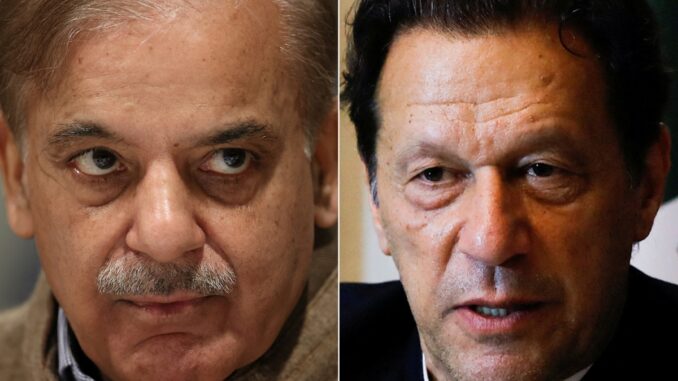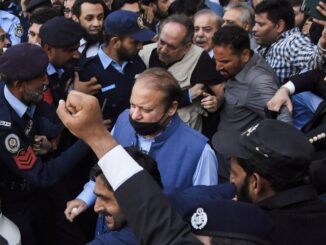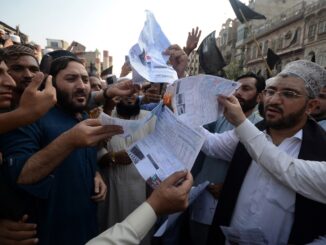
Islamabad, Pakistan – Pakistan’s Supreme Court has declared the country’s poll panel’s decision to delay the assembly elections in two provinces as “unconstitutional”.
The top court on Tuesday ordered the government to hold snap polls in the country’s most populous province of Punjab on May 14.
The court’s verdict followed a petition filed by the main opposition Pakistan Tehreek-e-Insaf (PTI) party, led by former Prime Minister Imran Khan.
Khan’s party had challenged the Election Commission of Pakistan’s (ECP) decision to delay the Punjab polls from April 30 to October 8 after the government refused to give funds to conduct the exercise citing the economic crisis.
The PTI in January decided to dissolve the Punjab and Khyber Pakhtunkhwa provincial assemblies it controlled in a bid to force early national elections – a demand Khan has been making since he was removed from power a year ago.
Pakistan historically holds the national and provincial elections together. However, the ECP is also bound by the constitution to hold elections within 90 days of the dissolution of a legislative assembly.
But when the ECP refused to announce dates for the polls, the Supreme Court in February took a suo motu notice and in a split 3-2 verdict, ordered the poll panel to announce the schedule for elections in the two provinces. A suo motu is when a court itself takes note of a matter which it deems is in the public interest and commences proceedings on it.
Last month, the ECP announced the Punjab elections on April 30. On March 22, however, it withdrew the schedule and declared October 8 as the new date, forcing the PTI to move the top court.
The Supreme Court said the ECP exceeded its jurisdiction by delaying the Punjab election date. “The constitution does not give the Election Commission of Pakistan the authority to postpone the elections,” it said.
On holding the polls in Khyber Pakhtunkhwa province, the top court said a petition should be filed at an appropriate forum.
The court also ordered the government to release 20 billion rupees ($70m) by April 10 for the elections and the ECP was asked to submit a report on available funds on April 11.
‘Watershed moment’
PTI lawyer Faisal Chaudhry said he was grateful to the Supreme Court for the verdict and for upholding the constitution.
Speaking to reporters outside the top court, Chaudhry said the court order is about “the future of Pakistan”, and the people of Pakistan will “protect this decision”.
“Our constitution, democracy, Supreme Court and high judiciary are all our red lines,” he said.
Senior PTI leader Shah Mahmood Qureshi also welcomed the verdict, calling it a “watershed moment” in Pakistan’s history.
“The Supreme Court has today buried the doctrine of necessity, restored the sanctity of the constitution and buried all those conspiratorial forces that were creating hurdles in the way of democracy and a democratic and constitutional system in this country,” Qureshi told reporters outside the court building.
Police officers stand guard outside the Supreme Court in Islamabad [Anjum Naveed/AP Photo]
Top court has ‘done its duty’
Lahore-based legal expert Asad Rahim Khan lauded the Supreme Court’s decision, saying it has “done its duty” to the law and the constitution “despite extraordinary pressure, and kept democracy on the rails”.
Khan said the government’s reservations were solely premised on delaying the polls and “did not have a shred of legal authority”.
He said it was an “absurd reading of the constitution” to say that the national and provincial polls are legally required to be held at the same time.
Meanwhile, lawyer Abdul Moiz Jaferii said with Tuesday’s verdict, the Supreme Court has solved only the “lesser of the crises it was involved in”.
“The greater crisis is of the court’s own making, and the [chief justice of Pakistan’s] failure to build consensus amongst his colleagues leaves it unresolved,” he told Al Jazeera.
Jaferii said the government’s stance to hold federal and provincial elections concurrently is rooted in them finding it politically expedient rather than any “consistent respect” for the constitution.
“The government is facing a likely defeat due to Imran Khan’s surging popularity. It is likely that they will try their best to delay the implementation of this order through a steady drip of creative excuse-making,” he said.
Gov’t-judiciary tussle
The top court’s verdict came amid a continuing tussle between the judiciary and the government, which last week passed a new law to curtail the powers of the Supreme Court’s chief justice.
Several government officials also publicly raised doubts about the fairness of the top court, expressing their “lack of confidence” in the three-member bench hearing the PTI case after two other judges quit.
The government had demanded a full bench with all the Supreme Court judges on it to hear the matter, but the top court rejected the request on Monday.
The government rejected Tuesday’s court decision, saying it will only “aggravate the crisis”.
Chaired by PM Sharif, the federal cabinet criticised the decision with Azam Nazir Tarar, the federal law minister, saying the court should have made the decision with “collective wisdom”, referring to the government’s plea of constituting a full court to hear the petition.
Tarar also spoke in Parliament, accusing former PM Khan of creating “political chaos”.
“We requested the chief justice that there is a division in your own house of justice. You must try and unite your own house. We implored you to put aside ego and form a full court,” he said.
Referring to Chief Justice Umar Ata Bandial, Foreign Minister Bilawal Bhutto Zardari said: “When your own court and your own judges express no confidence in your character and the bench, and distance themselves when such an important question is before you, then the appropriate thing to do is to form a larger bench.”
Lawyer Jaferii told Al Jazeera it was the “failure to form a full court and exhibit a united front which has allowed the government to issue the threats it has subtly conveyed over the weekend”.
“These threats will only get louder now that the expected decision has been announced,” the Karachi-based lawyer said.
Supreme Court orders the government to hold snap polls in the country’s most populous province of Punjab on May 14.
ENB Top News
ENB
Energy Dashboard
ENB Podcast
ENB Substack



